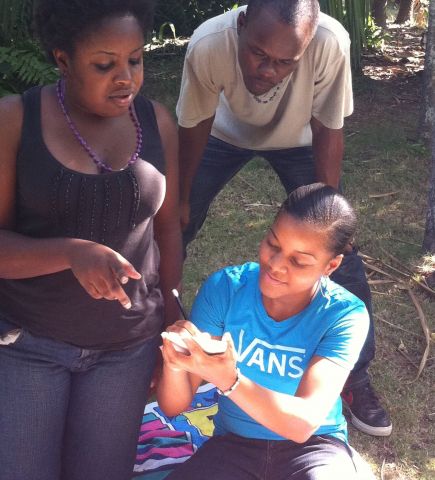Article: The Family Behind the Music

By Shantel Thomas
Known for its wide repertoire, the UWI Panoridim Steel Orchestra has never fallen short of its ten commandments of pan. From symphonies to mambos played by their magnificent seven sections, the orchestra continues to expand its reputation of being enthusiastic, energetic and entertaining. Though capable of making six songs or more collide during a performance, love for the music and what we do as a band often blocks any desire to take five. Our passion is fuelled by supporters chanting requests such as “Four Lara!”, through crowds as thick as those in Halfway Tree. Yet at the end of it all, it comes down to just the two of us: the player and the instrument.
What serves to separate and differentiate the UWI Panoridim Steel Orchestra (referred to as Panoridim) from other orchestras is the family behind the music. We all are one.
The steel pan, a percussion instrument, was invented on the twin island country of Trinidad and Tobago in the 1930’s. It had been developed by youths who, having been denied the opportunity to play their ancestral drums turned to empty oil drums to satisfy a musical yearning (Walrond, 2007). Ironically, an instrument forged out of resistance and rebellion is the same instrument played by both active and prospective members, out of total submission and compliance to our musical authorities.
The process of becoming a member of Panoridim is somewhat rigorous, thus ensuring that the best quality is maintained. Before becoming a member, one is required to do a ‘rhythm audition’. Once successful, the prospective members are classified as members of the band even though the unwritten culture of the orchestra states otherwise. Consider a young child being adopted into a family, in the same way, much evaluation, constructive criticisms and scrutiny is necessary to guarantee that each party is compatible for building a life-long relationship.
Initially we were branded with the title “NEW members”, a verbal reminder of our stance as it relates to the orchestra’s hierarchical structure. Growth towards being fully accepted and integrated into the family became evident with every performance, every hour of every rehearsal, and every strike our now much loved sticks made as music was created. Music is defined as “the art of arranging tones in an orderly sequence, so to produce a unified and continuous composition" (Webster II, 1984). Eventually, the bonds were strengthened between who were once viewed as new members and the existing members, as the flow of communication and interaction got easier. From here, the musical journey officially began for the academic year, paving the way as an excuse to act and function ‘crazy’, one of the typical characteristics of a Panoridim member.
Founded in 1977, the driving force of Panoridim has always been its members, proof of a phrase well known by all, “the band that lymes together stays together”. A lyme (as known by the orchestra) refers to the gathering of band members for the purpose of socializing, conversations, or recreation. This is an integral aspect of being in the band as it builds rapport and teaches us to be our brother’s keepers. It makes us more than just a band, rather a family. It is not flesh and blood, but the pans that makes us family.
To learn a song takes time and dedication, especially if the song was Dus in di Face, Pan in A-Minor, Band from Space or Steel Pan Alley. The majority of our time is spent in the panyard, our home away from home, emphasized by the fact that it is referred to as a yard and not a room. There is even a refrigerator and several other appliances located inside. How much more comfort could one ask for? This is as good as it gets. Additionally, following a long, hard day at school or work, it is always soothing to arrive at rehearsals. The sound of laughter echoing from the panyard may be heard from miles away as you make your way there, aided by pleasant greetings upon entering, as you leave the baggage of a stressful day at the gate.
Despite the fact that there are seven unique sections, which evidently gives rise to sub-families within the family, knowing how to support each band member, whether academically or socially, has always been another of Panoridim’s innate qualities. Members in the band ensure that you are academically stable. However, it is to be noted that they are not the only ones contributing to our mental well being. Studies have shown that music involvement influences academic achievement because it facilitates brain development. Brain scans taken during musical performances show that virtually the entire cerebral cortex is active when musicians are performing (Bobb-Alleyne-Dann, 2009). We have to plan ahead so that our hands and sticks are in the right place to play the next note. It is safe to say that being a part of Panoridim has more than likely significantly improved our teamwork and aural skills. From a personal point of view, it has also built my concentration skills, which as a student of The University of the West Indies, I had transferred to my learning and examinations throughout the semesters. Persistence was also another admirable quality obtained at UWI. When learning music and similarly various lecture topics, I didn’t always get it right, but through hard work and persistence I was able to accomplish what then seemed unobtainable.
It is no doubt that the UWI Panoridim Steel Orchestra is a band of high caliber, geared towards molding and creating well rounded and musically inclined individuals. I predict the orchestra will progress due to its culture of love for the music and each other.
One band, One sound.




